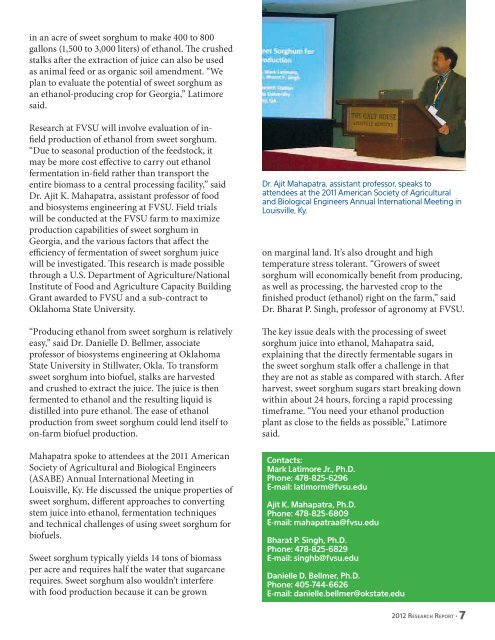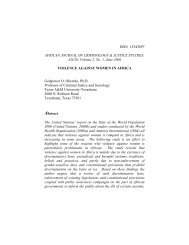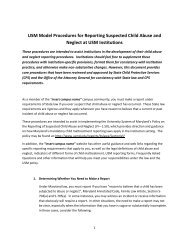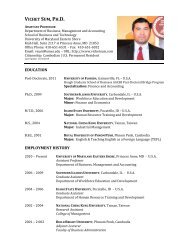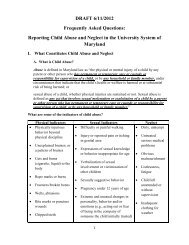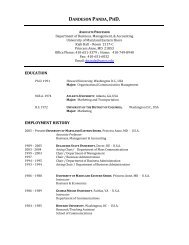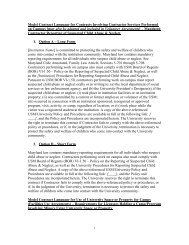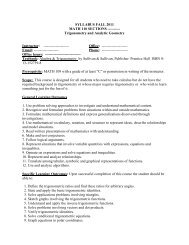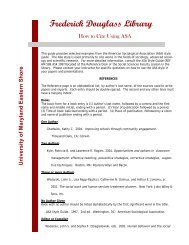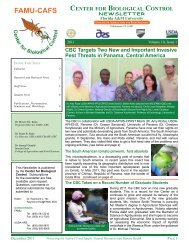FVSU Research Report 2012 - Fort Valley State University
FVSU Research Report 2012 - Fort Valley State University
FVSU Research Report 2012 - Fort Valley State University
Create successful ePaper yourself
Turn your PDF publications into a flip-book with our unique Google optimized e-Paper software.
in an acre of sweet sorghum to make 400 to 800<br />
gallons (1,500 to 3,000 liters) of ethanol. The crushed<br />
stalks after the extraction of juice can also be used<br />
as animal feed or as organic soil amendment. “We<br />
plan to evaluate the potential of sweet sorghum as<br />
an ethanol-producing crop for Georgia,” Latimore<br />
said.<br />
<strong>Research</strong> at <strong>FVSU</strong> will involve evaluation of infield<br />
production of ethanol from sweet sorghum.<br />
“Due to seasonal production of the feedstock, it<br />
may be more cost effective to carry out ethanol<br />
fermentation in-field rather than transport the<br />
entire biomass to a central processing facility,” said<br />
Dr. Ajit K. Mahapatra, assistant professor of food<br />
and biosystems engineering at <strong>FVSU</strong>. Field trials<br />
will be conducted at the <strong>FVSU</strong> farm to maximize<br />
production capabilities of sweet sorghum in<br />
Georgia, and the various factors that affect the<br />
efficiency of fermentation of sweet sorghum juice<br />
will be investigated. This research is made possible<br />
through a U.S. Department of Agriculture/National<br />
Institute of Food and Agriculture Capacity Building<br />
Grant awarded to <strong>FVSU</strong> and a sub-contract to<br />
Oklahoma <strong>State</strong> <strong>University</strong>.<br />
“Producing ethanol from sweet sorghum is relatively<br />
easy,” said Dr. Danielle D. Bellmer, associate<br />
professor of biosystems engineering at Oklahoma<br />
<strong>State</strong> <strong>University</strong> in Stillwater, Okla. To transform<br />
sweet sorghum into biofuel, stalks are harvested<br />
and crushed to extract the juice. The juice is then<br />
fermented to ethanol and the resulting liquid is<br />
distilled into pure ethanol. The ease of ethanol<br />
production from sweet sorghum could lend itself to<br />
on-farm biofuel production.<br />
Mahapatra spoke to attendees at the 2011 American<br />
Society of Agricultural and Biological Engineers<br />
(ASABE) Annual International Meeting in<br />
Louisville, Ky. He discussed the unique properties of<br />
sweet sorghum, different approaches to converting<br />
stem juice into ethanol, fermentation techniques<br />
and technical challenges of using sweet sorghum for<br />
biofuels.<br />
Sweet sorghum typically yields 14 tons of biomass<br />
per acre and requires half the water that sugarcane<br />
requires. Sweet sorghum also wouldn’t interfere<br />
with food production because it can be grown<br />
Dr. Ajit Mahapatra, assistant professor, speaks to<br />
attendees at the 2011 American Society of Agricultural<br />
and Biological Engineers Annual International Meeting in<br />
Louisville, Ky.<br />
on marginal land. It’s also drought and high<br />
temperature stress tolerant. “Growers of sweet<br />
sorghum will economically benefit from producing,<br />
as well as processing, the harvested crop to the<br />
finished product (ethanol) right on the farm,” said<br />
Dr. Bharat P. Singh, professor of agronomy at <strong>FVSU</strong>.<br />
The key issue deals with the processing of sweet<br />
sorghum juice into ethanol, Mahapatra said,<br />
explaining that the directly fermentable sugars in<br />
the sweet sorghum stalk offer a challenge in that<br />
they are not as stable as compared with starch. After<br />
harvest, sweet sorghum sugars start breaking down<br />
within about 24 hours, forcing a rapid processing<br />
timeframe. “You need your ethanol production<br />
plant as close to the fields as possible,” Latimore<br />
said.<br />
Contacts:<br />
Mark Latimore Jr., Ph.D.<br />
Phone: 478-825-6296<br />
E-mail: latimorm@fvsu.edu<br />
Ajit K. Mahapatra, Ph.D.<br />
Phone: 478-825-6809<br />
E-mail: mahapatraa@fvsu.edu<br />
Bharat P. Singh, Ph.D.<br />
Phone: 478-825-6829<br />
E-mail: singhb@fvsu.edu<br />
Danielle D. Bellmer, Ph.D.<br />
Phone: 405-744-6626<br />
E-mail: danielle.bellmer@okstate.edu


